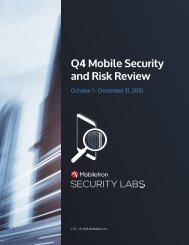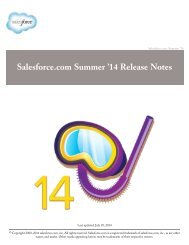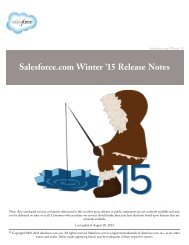salesforce_security_impl_guide
salesforce_security_impl_guide
salesforce_security_impl_guide
You also want an ePaper? Increase the reach of your titles
YUMPU automatically turns print PDFs into web optimized ePapers that Google loves.
Securing and Sharing Data<br />
Criteria-Based Sharing Rules Overview<br />
Type<br />
Contact sharing rules<br />
Custom object sharing rules<br />
Lead sharing rules<br />
Based on<br />
Contact owner or other criteria, including<br />
contact record types or field values<br />
Custom object owner or other criteria,<br />
including custom object record types or<br />
field values<br />
Lead owner or other criteria, including lead<br />
record types or field values<br />
Set Default Sharing Access for<br />
Individual contacts and associated accounts<br />
Individual custom object records<br />
Individual leads<br />
Opportunity sharing rules<br />
Opportunity owner or other criteria,<br />
including opportunity record types or field<br />
values<br />
Individual opportunities and their associated<br />
accounts<br />
User sharing rules<br />
Group membership or other criteria,<br />
including username and whether the user<br />
is active<br />
Individual user records<br />
Note:<br />
• You can’t include high-volume portal users in sharing rules because they don’t have roles and can’t be in public groups.<br />
• Developers can use Apex to programmatically share custom objects (based on record owners, but not other criteria). This does<br />
not apply to User Sharing.<br />
Criteria-Based Sharing Rules Overview<br />
Criteria-based sharing rules determine whom to share records with based on field values in records.<br />
For example, let’s say you use a custom object for job applications, with a custom picklist field<br />
named “Department.” You can create a criteria-based sharing rule that shares all job applications<br />
in which the Department field is set to “IT” with all IT managers in your organization.<br />
Note:<br />
• Although criteria-based sharing rules are based on values in the records and not the<br />
record owners, a role or territory hierarchy still allows users higher in the hierarchy to<br />
access the records.<br />
• You can’t use Apex to create criteria-based sharing rules. Also, criteria-based sharing<br />
cannot be tested using Apex.<br />
• You can use the Metadata API to create criteria-based sharing rules starting in API version<br />
24.0.<br />
• You can’t include high-volume portal users in sharing rules because they don’t have roles<br />
and can’t be in public groups.<br />
EDITIONS<br />
Available in: Professional,<br />
Enterprise, Performance,<br />
Unlimited, Developer, and<br />
Database.com Editions<br />
Accounts, Opportunities,<br />
Cases, and Contacts are not<br />
available in Database.com<br />
You can create criteria-based sharing rules for accounts, opportunities, cases, contacts, leads, campaigns, and custom objects. You can<br />
create up to 50 criteria-based sharing rules per object.<br />
• Record types<br />
• These field types:<br />
50






